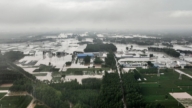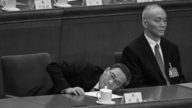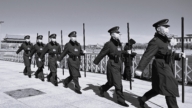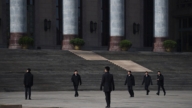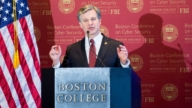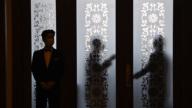【新唐人2013年10月29日訊】原定今年8月召開的「第九屆北京—東京論壇」,由於中、日兩國關係惡化,推遲到這個月(10月)的26號才舉行。這次論壇,中、日雙方代表又因釣魚島糾紛,再度引發了言語衝突。不過會議結束,雙方發表了《北京共識》,雙方表示,在釣魚島問題上,應儘可能避免軍事衝突。
原定在8月《中日友好條約》簽署35週年時舉行的「第九屆北京—東京論壇」,27號已經閉幕, 據了解,中日雙方代表因釣魚島糾紛,發生了不愉快氣氛。
代表中方出席的前國務委員兼中日友好協會會長唐家璇,在致辭中重申中國擁有釣魚島主權,他批評日本政府把釣魚島國有化,而讓中日關係陷入最嚴峻的局面。
日本前防衛廳長官中谷元在唐家璇離場後的專題討論中,針對唐家璇的講話批評說﹕唐家璇說話「太過肆無忌憚」、「愛說甚麼便說甚麼,沒有禮貌,言論卑劣」。他諷刺唐家璇作為一國政要,「發言沒有國際水準」。
唐家璇還要求日方妥善處理靖國神社問題,對此,中谷元表示,安倍晉三政府的積極和平主義,是基於自由、民主主義及法律支配的外交方針。
另一方面,針對日系企業去年在中國的反日遊行中遇到襲擊一事,日本前首相福田康夫表示,這使日本全體國民都受到了打擊。他呼籲中方防止此類暴力行為再次發生。
原紐約州立大學教授 謝選駿:「中日之間,就釣魚島發生的爭端,只是冰山一角,只是一個導火線,它的背後就是中日雙方的歷史宿怨、歷史宿仇。」
雖然兩國代表發生爭議,卻不影響雙方達成《北京共識》。
主辦單位在論壇結束後發表《北京共識》。雙方達成的共識包括﹕中、日必須永遠堅持和平共處的原則﹔面對釣魚島爭議,兩國政府應及時展開對話和談判,通過和平方式解決爭端,並建立機制,避免出現糾紛甚至軍事衝突。
謝選駿:「中、日雙方的戰爭實際上是不可避免的,只是說這個戰爭的規模有多大的問題。至於現在雙方在那信誓旦旦的說,雙方不發生戰爭,這實際上正好是正在走向戰爭的一個體現。」
美國紐約城市大學政治學教授夏明:「包括在軍方和民間、知識界,都有想對日本開戰,甚至對美國開戰這種言論,這種言論就形成中國不斷在醜化日本,這樣的話就是說,民間對日本的仇恨情緒其實一直在升溫。」
北京—東京論壇由中方的英文《中國日報》和日方民間團體「言論NPO」主辦,每年輪流在北京和東京之間舉辦一次。這次為期兩天的第九屆論壇,雙方共約60名政經界及媒體人士出席,共同討論政治、安全、經濟、傳媒等議題,探索改善兩國關係的途徑。
與會雙方代表都同意迴避釣魚島海域軍事衝突、和建立海上聯絡機制等重要問題。但對日本首相安倍晉三提出的「積極和平主義」,中方指責安倍「重大的轉換了戰後的防衛方針」。
而對日方代表集中指責中國增加國防費用和用途不透明,中方少將朱虎成則反駁「這是中國軍事發展的必然」,朱虎成指責東亞局勢緊張是由美國亞太戰略而起。
與此同時,根據英國廣播公司《BBC》報導,日本防衛省27號發佈消息,當天發現中共空軍兩架Y-8預警機和兩架H-6轟炸機,飛越沖繩主島和宮古島之間的公海上空,在東海和太平洋之間往返飛行。中共軍機已連續3天沿此路線飛行,都是兩架Y-8和兩架H-6。日本防衛省對中共在東海的動向繼續加強警戒。
採訪/常春 編輯/黃億美 後製/陳建銘
The 9th Beijing-Tokyo Forum Was Tense But A Consensus was Reached
The 9th Beijing-Tokyo Forum was scheduled in August
but was postponed to Oct. 26 due to the increased tension
between the two countries.
During the forum, both sides had a verbal argument
over the Diaoyu Islands issue.
However, at the end of the meeting, they both signed
the Beijing Consensus.
The consensus states that they will attempt to avoid
a military conflict over the Diaoyu Islands dispute.
The 9th Beijing-Tokyo Forum, which had initially been
scheduled for August to mark the 35th anniversary of the
signing of the bilateral treaty of peace and friendship,
wrapped up in Beijing on Oct. 27.
Sources say that Sino-Japan representatives had
an unpleasant argument regarding the Diaoyu Islands dispute.
Tang Jiaxuan is a former Chinese State Councilor and also
head of the Sino-Japan Friendship Association.
He emphasized China’s sovereignty over the Diaoyu Islands.
He criticized that the Japanese government nationalized
the Diaoyu Islands, intensifying the relationship.
Former Japanese defense chief Gen Nakatani criticized
Tang’s manner in the seminar after Tang left.
He said that Tang’s speech is “over impudent,”
“casual talk, rude, and despicable.”
Being a country’s senior politician, Tang has
“no international standard,” said Nakatani.
Tang requested Japan properly
handle the Yasukuni Shrine issue.
Nakatani responded that the Japanese government’s active
pacifism is based on freedom, democracy and the laws
that govern the diplomatic policy.
Regarding Japanese firms being attacked during
an anti-Japanese parade last year in China,
Yasuo Fukuda, former Japanese Prime Minister,
says that it hurts all people in Japan.
He urged China to stop such violence in the future.
Xie Xuanjun, former Professor of the State University
of New York: “Between China and Japan, the Diaoyu Islands
dispute is the tip of iceberg, just a fuse.
Behind it is a historic feud.”
Although both countries’representatives had an argument,
it didn’t influence their signing of the Beijing Consensus.
The Beijing Consensus was announced
at the end of the forum.
It states that the two countries should eternally hold on
to the principle of peaceful co-existence;
Facing the current dispute over the Diaoyu Islands issue,
it is imperative for the two governments to have a dialogue
and negotiations to solve the dispute through peaceful means,
and establish a crisis control mechanism to prevent conflicts
or even military conflicts.
Xie Xuanjun: “A Sino-Japanese War is likely inevitable.
It is the issue of the scale of the war.
Currently, both sides vowing not to start a war actually
shows they are going to have a war.”
Xia Ming, Professor of Political Science at the City
University of New York: “There are signs that the civil
society, military, and intellectual circles hope to fight Japan.
They even to talk about fighting the US.
These words continued to demonize the Japanese in China,
thus the hatred and discrimination against Japan
amongst the civilians is soaring.”
The Beijing-Tokyo Forum was co-sponsored by China Daily
and Japanese Genron NPO.
The forum is held each year in Beijing and Tokyo in turn.
The two-day forum this year had about 60 attendees
from political, economic, and journalistic circles.
They exchanged views on politics, security, economy
and media, exploring ways to improve bilateral relations.
Both sides agreed to avoid military conflict over the Diaoyu
Islands, establishing a maritime liaison mechanism.
Regarding Japanese Prime Minister Shinzo Ape’s active
pacifism, China accused Ape of greatly changing
Japan’s postwar defense strategy.
The Japanese side criticized China of increased defense
spending and non-transparency.
China’s Major General Zhu Chenghu defended that
“this is an inevitable military development of China.”
Zhu attributed the tense East Asian situation to the US
Asia-Pacific strategy.
Meanwhile, the BBC Chinese edition website reported that
Japan’s defense ministry made an announcement on Oct. 27.
They spotted the military aircrafts Y-8 and H-6 flying
over public seas between Chongsheng Island and Gonggu Islands.
The Chinese aircraft flew back and forth
between the East Sea and the Pacific ocean.
Two fighter jets Y-8 and two H-6 were spotted for a third
consecutive day following this flight path.
Japan’s defense ministry was on high alert
regarding China’s action.


